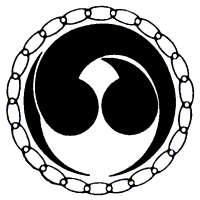Ichiwa-kai

Ichiwa-kai ( Japanese 一 和 会 ) was a group of the Japanese yakuza . At the time it was founded, it was one of the three largest groups in the country.
history
The Ichiwa-kai was founded in June 1984 in Kobe by Hiroshi Yamamoto and eighteen other high-ranking members of the Yamaguchi-gumi . This move was a reaction to the election of Masahisa Takenaka as the new gang leader ( Kumichō ) of Yamaguchi-gumi. Almost half of the 13,000 members of the Yamaguchi-gumi followed Yamamoto and made Ichiwa-kai one of the three largest yakuza groups in the country in one fell swoop. At the same time, it took over a large part of the arsenal and many of the economically oriented high-ranking yakuza, which further weakened Yamaguchi-gumi. This led to tension between the two organizations in the months that followed. To cope with the situation, Yamaguchi-gumi introduced a pension scheme for its members and at the same time announced an amnesty for all yakuza who rejoined the organization. In the period that followed, the Yamaguchi-gumi grew to around 10,000 members and again became the largest yakuza group in Japan, while Ichiwa-kai shrank to 2,800 members.
When it became clear that the Ichiwa-kai would fail against Yamaguchi-gumi, an attack on Takenaka took place on the evening of January 26, 1985. At least four members of Ichiwa-kai shot dead Takenaka and his two companions in the house of Takenaka's lover , located in Osaka . His companions died instantly while Takenaka managed to escape seriously injured in his car to his nearby office. An emergency operation carried out in the hospital was unsuccessful. This decapitation only helped Ichiwa-kai for a short time. Takenaka's death led to the " Yama Ichi War " ( 山 一 戦 争 , Yama-Ichi Sensō ), the worst gang war in post-war Japanese history, during which more than 300 shootings occurred and 25 people died. Slowly but surely, the Ichiwa-kai lost ground while the Yamaguchi-gumi regained their old strength. In terms of members and meanwhile also inferior in weapons, the Ichiwa-kai, which at that time were only a small group of Yakuza, finally disbanded in 1989 and the war ended.
literature
- Wolfgang Herbert: Japan after sunset: Among gangsters, illegals and day laborers . (2002)
- David E. Kaplan, Alec Dubro: Yakuza: Japan's Criminal Underworld (University of California Press, 2012)